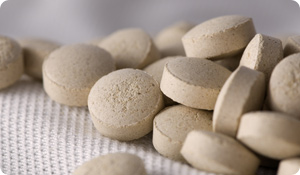
You may have heard that a hormone called dehydroepiandrosterone, or DHEA, is the key to longevity. Produced naturally by our bodies, it facilities the production of other hormones such as testosterone and estrogen. But some people, looking for the secret to agelessness, are supplementing their bodies' own DHEA with a synthetic version of the hormone, sold in this country in pill form. Perhaps you've even been tempted to try it yourself. After all, the claims are pretty persuasive: Lose weight, gain muscle, live longer, prevent disease. Why wouldn't you succumb to such a temptation?
It turns out that marketers' claims about the superpowers of DHEA don't have much science to back them up. While taking a DHEA supplement can raise your DHEA levels up to those of someone much younger (DHEA levels peak in our 20s and slowly fall), that higher level doesn't always translate into measurable physical improvements. Study results are somewhat mixed. For instance, there have been recent studies showing that DHEA possibly improves hipbone mineral density, spine bone mineral density, concentration, and memory. Yet other studies show no concrete benefit. A 2006 study conducted by the Mayo Clinic followed older adults who took DHEA supplements over a two-year period and found that they did not have greater muscle mass, lower fat levels, enhanced athletic performance or better quality of life over those who didn't take supplemental DHEA. Another Mayo Clinic study found that postmenopausal women who engaged in regular exercise did not see any health benefits from supplemental DHEA.
If you're still considering taking DHEA, consider that DHEA has been found in some studies to cause:
- Reduced HDL, or "good," cholesterol levels
- Facial hair in women
- Acne
Researchers also are concerned that because of its tendency to raise testosterone and estrogen levels, DHEA could over time elevate users' risk of cancers that are linked to hormones. These include prostate cancer and breast cancer. Experts stress that people, rather than relying on supplements to give them eternal youth, need to focus on eating nutritiously, exercising regularly, sleeping well, managing stress, and getting regular physicals in order to reap good health and longevity.





